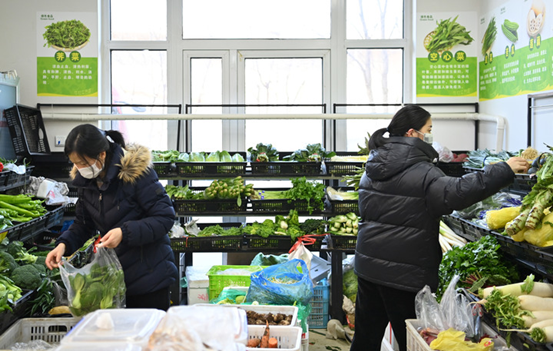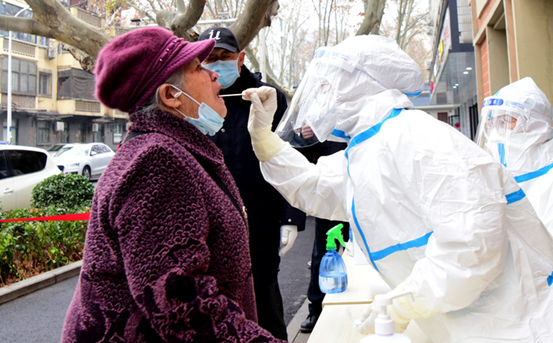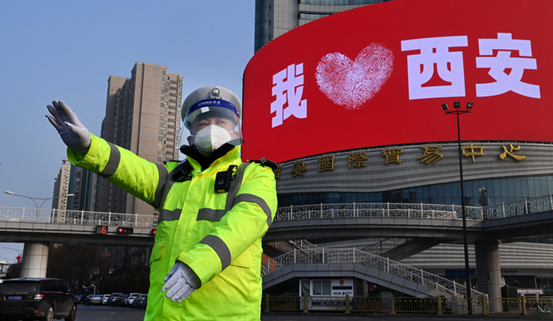Overview: China's three cities in fight against COVID-19
Three Chinese cities are battling against COVID-19 resurgence. Tianjin and Zhengzhou are reporting over 100 new cases per day, while Xi’an sees a steady decline of cases.
North China’s Tianjin Municipality reported 137 local cases as of 2 p.m. Wednesday.
Central China's Zhengzhou logged 115 local cases as of Tuesday.
Meanwhile, northwest China’s Xi’an has seen a sharp decline in new cases about a month into this wave of resurgence. With eight new locally transmitted cases reported on Tuesday, the city has for the first time witnessed single-digit new cases since late December.
Following the overall “dynamic zero-case policy,” the three cities have adopted tailored measures in accordance with the severity of the situation while striving to maintain the normal functioning of society.

Residents select vegetables in a shop in north China's Tianjin, Jan. 11, 2022. North China's Tianjin Municipality which has witnessed the latest COVID-19 resurgence has launched an emergency response mechanism to guarantee the supply of daily necessities. (Xinhua/Li Ran)
Tianjin: necessary supplies ensured amid control of Omicron spread
Following the Omicron outbreak on Sunday, Tianjin immediately took action to block the spread of the epidemic, asking local residents not to leave the city unless necessary.
The second round of citywide mass nucleic acid testing was launched on Wednesday, two days after the first round, amid efforts to find out possible infections and quickly contain the epidemic.
The municipality, with a population of 13.86 million, set up a large COVID-19 testing lab to meet the demand for citywide mass nucleic acid tests. The lab can test 1.2 million nucleic acid samples per day. Test results are returned within four to six hours.
The municipality has launched an emergency response mechanism to ensure people’s access to daily necessities.
Local authorities have mobilized major wholesale suppliers, supermarkets and vegetable markets to increase inventory in order to cope with the market demand for meat, eggs and vegetables. All major supermarkets and vegetable markets have replenished goods in time to make sure that essential commodities are not out of stock.
Meanwhile, the government has used both online and offline channels to ensure citizens get daily necessities. People can place their orders online and receive their deliveries from neighborhood outlets, which saves them from travelling and reduces risk of transmission.

A medical worker takes swab sample for COVID-19 tests at a testing site in Zhengzhou, central China's Henan Province, Jan. 7, 2022. The city has carried out rounds of all-inclusive nucleic acid testing to help curb the spread of COVID-19. (Xinhua/Zhu Xiang)
Zhengzhou: measures upgraded to curb COVID-19 spread
Zhengzhou has carried out epidemiological surveys to identify the transmission chain of the virus and close contacts of confirmed cases. It carried out six citywide mass testings.
To better contain the COVID-19 spread, kindergartens, and primary and secondary schools in the city have suspended in-person classes and held classes online from Monday, while all the city's restaurants have stopped offering dine-in services.
Nonessential public places have been temporarily closed, while the city's supermarkets, convenience stores, bakeries, farmers' markets, medical institutions, banks and offices will continue to provide essential services.
Passenger transport services including shuttle buses, tourist transport, intercity ride-hailing and taxi services have been suspended. Those who enter the city must provide negative nucleic acid test results taken within 48 hours and green health codes, as Zhengzhou has enforced traffic control measures.

A policeman directs traffic at a crossroad in Xi'an, capital of northwest China's Shaanxi Province, Jan. 10, 2022. Local authorities advance the orderly resumption of businesses dealing with the supply of necessities, postal and express delivery services, and the catering industry, amid the latest COVID-19 resurgence. (Xinhua/Tao Ming)
Xi’an: threat of major COVID-19 resurgence under control
Xi’an has mostly stopped the spread of COVID-19 in communities one month after the resurgence of the epidemic hit the city.
Most of the city’s regions are designated as low-risk, as the city claims that it has mostly cut off the community spread of the virus. It is gradually reopening businesses that supply necessities, postal and express delivery services, and the catering industry.
The upturn in the latest citywide COVID combat is hard-earned by residents in Xi’an.
Citywide lockdown and rounds of mass testings of all residents have greatly curbed the spread of the virus. Community workers and volunteers have played a key role in keeping the city alive amid strict lockdown measures, sending food, groceries and medicine to residents in lockdown and helping organize nucleic acid testing and vaccination. People’s access to essential medical services and adequate supplies have also been guaranteed.
Photos
Related Stories
- Hong Kong researchers say they develop novel material able to kill COVID-19 virus
- Over 30 pct of Asian American residents in major California Asian community report experiencing hate incident during pandemic: survey
- Expats stay upbeat as Tianjin goes full throttle to contain COVID-19 resurgence
- Botched U.S. COVID-19 policy poisons world
- Commentary: Xi's words shed light on future of humanity as COVID-19 rages
Copyright © 2022 People's Daily Online. All Rights Reserved.










